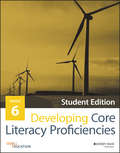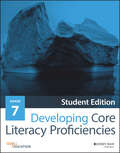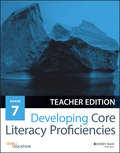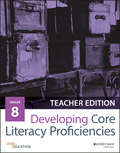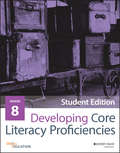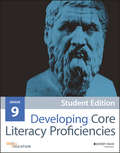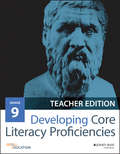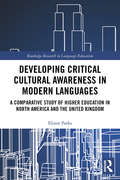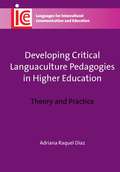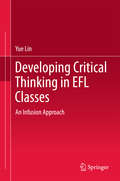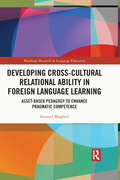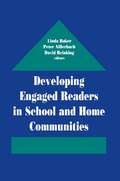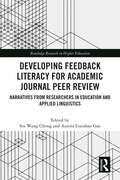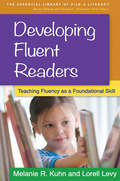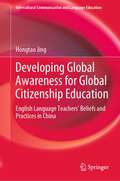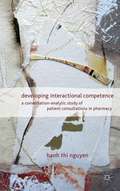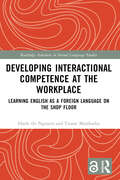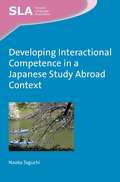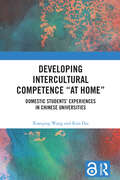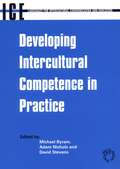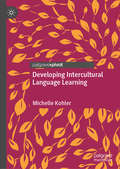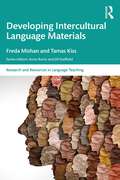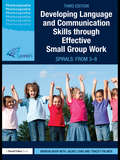- Table View
- List View
Developing Core Literacy Proficiencies, Grade 6
by Odell EducationThe Developing Core Literacy Proficiencies program is an integrated set of English Language Arts/Literacy units spanning grades 6-12 that provide student-centered instruction on a set of literacy proficiencies at the heart of the Common Core State Standards (CCSS). Reading Closely for Textual Details Making Evidence-Based Claims Making Evidence-Based Claims about Literary Technique (Grades 9-12) Researching to Deepen Understanding Building Evidence-Based Arguments The program approaches literacy through the development of knowledge, literacy skills, and academic habits. Throughout the activities, students develop their literacy along these three paths in an integrated, engaging, and empowering way. Knowledge: The texts and topics students encounter in the program have been carefully selected to expose them to rich and varied ideas and perspectives of cultural significance. These texts not only equip students with key ideas for participating knowledgeably in the important discussions of our time, but also contain the complexity of expression necessary for developing college- and career-ready literacy skills. Literacy Skills: The program articulates and targets instruction and assessment on twenty CCSS-aligned literacy skills ranging from “making inferences” to “reflecting critically.” Students focus on this set of twenty skills throughout the year and program, continually applying them in new and more sophisticated ways. Academic Habits: The program articulates twelve academic habits for students to develop, apply, and extend as they progress through the sequence of instruction. Instructional notes allow teachers to introduce and discuss academic habits such as “preparing” and “completing tasks” that are essential to students’ success in the classroom. The program materials include a comprehensive set of instructional sequences, teacher notes, handouts, assessments, rubrics, and graphic organizers designed to support students with a diversity of educational experiences and needs. The integrated assessment system, centered around the literacy skills and academic habits, allows for the coherent evaluation of student literacy development over the course of the year and vertically across all grade levels.
Developing Core Literacy Proficiencies, Grade 7
by Odell EducationThe Developing Core Literacy Proficiencies program is an integrated set of English Language Arts/Literacy units spanning grades 6-12 that provide student-centered instruction on a set of literacy proficiencies at the heart of the Common Core State Standards (CCSS). Reading Closely for Textual Details Making Evidence-Based Claims Making Evidence-Based Claims about Literary Technique (Grades 9-12) Researching to Deepen Understanding Building Evidence-Based Arguments The program approaches literacy through the development of knowledge, literacy skills, and academic habits. Throughout the activities, students develop their literacy along these three paths in an integrated, engaging, and empowering way. Knowledge: The texts and topics students encounter in the program have been carefully selected to expose them to rich and varied ideas and perspectives of cultural significance. These texts not only equip students with key ideas for participating knowledgeably in the important discussions of our time, but also contain the complexity of expression necessary for developing college- and career-ready literacy skills. Literacy Skills: The program articulates and targets instruction and assessment on twenty CCSS-aligned literacy skills ranging from “making inferences” to “reflecting critically.” Students focus on this set of twenty skills throughout the year and program, continually applying them in new and more sophisticated ways. Academic Habits: The program articulates twelve academic habits for students to develop, apply, and extend as they progress through the sequence of instruction. Instructional notes allow teachers to introduce and discuss academic habits such as “preparing” and “completing tasks” that are essential to students’ success in the classroom. The program materials include a comprehensive set of instructional sequences, teacher notes, handouts, assessments, rubrics, and graphic organizers designed to support students with a diversity of educational experiences and needs. The integrated assessment system, centered around the literacy skills and academic habits, allows for the coherent evaluation of student literacy development over the course of the year and vertically across all grade levels.
Developing Core Literacy Proficiencies, Grade 7
by Odell EducationThe Developing Core Literacy Proficiencies program is an integrated set of English Language Arts/Literacy units spanning grades 6-12 that provide student-centered instruction on a set of literacy proficiencies at the heart of the Common Core State Standards (CCSS). Reading Closely for Textual Details Making Evidence-Based Claims Making Evidence-Based Claims about Literary Technique (Grades 9-12) Researching to Deepen Understanding Building Evidence-Based Arguments The program approaches literacy through the development of knowledge, literacy skills, and academic habits. Throughout the activities, students develop their literacy along these three paths in an integrated, engaging, and empowering way. Knowledge: The texts and topics students encounter in the program have been carefully selected to expose them to rich and varied ideas and perspectives of cultural significance. These texts not only equip students with key ideas for participating knowledgeably in the important discussions of our time, but also contain the complexity of expression necessary for developing college- and career-ready literacy skills. Literacy Skills: The program articulates and targets instruction and assessment on twenty CCSS-aligned literacy skills ranging from “making inferences” to “reflecting critically.” Students focus on this set of twenty skills throughout the year and program, continually applying them in new and more sophisticated ways. Academic Habits: The program articulates twelve academic habits for students to develop, apply, and extend as they progress through the sequence of instruction. Instructional notes allow teachers to introduce and discuss academic habits such as “preparing” and “completing tasks” that are essential to students’ success in the classroom. The program materials include a comprehensive set of instructional sequences, teacher notes, handouts, assessments, rubrics, and graphic organizers designed to support students with a diversity of educational experiences and needs. The integrated assessment system, centered around the literacy skills and academic habits, allows for the coherent evaluation of student literacy development over the course of the year and vertically across all grade levels.
Developing Core Literacy Proficiencies, Grade 8
by Odell EducationThe Developing Core Literacy Proficiencies program is an integrated set of English Language Arts/Literacy units spanning grades 6-12 that provide student-centered instruction on a set of literacy proficiencies at the heart of the Common Core State Standards (CCSS). Reading Closely for Textual Details Making Evidence-Based Claims Making Evidence-Based Claims about Literary Technique (Grades 9-12) Researching to Deepen Understanding Building Evidence-Based Arguments The program approaches literacy through the development of knowledge, literacy skills, and academic habits. Throughout the activities, students develop their literacy along these three paths in an integrated, engaging, and empowering way. Knowledge: The texts and topics students encounter in the program have been carefully selected to expose them to rich and varied ideas and perspectives of cultural significance. These texts not only equip students with key ideas for participating knowledgeably in the important discussions of our time, but also contain the complexity of expression necessary for developing college- and career-ready literacy skills. Literacy Skills: The program articulates and targets instruction and assessment on twenty CCSS-aligned literacy skills ranging from “making inferences” to “reflecting critically.” Students focus on this set of twenty skills throughout the year and program, continually applying them in new and more sophisticated ways. Academic Habits: The program articulates twelve academic habits for students to develop, apply, and extend as they progress through the sequence of instruction. Instructional notes allow teachers to introduce and discuss academic habits such as “preparing” and “completing tasks” that are essential to students’ success in the classroom. The program materials include a comprehensive set of instructional sequences, teacher notes, handouts, assessments, rubrics, and graphic organizers designed to support students with a diversity of educational experiences and needs. The integrated assessment system, centered around the literacy skills and academic habits, allows for the coherent evaluation of student literacy development over the course of the year and vertically across all grade levels.
Developing Core Literacy Proficiencies, Grade 8
by Odell EducationThe Developing Core Literacy Proficiencies program is an integrated set of English Language Arts/Literacy units spanning grades 6-12 that provide student-centered instruction on a set of literacy proficiencies at the heart of the Common Core State Standards (CCSS). Reading Closely for Textual Details Making Evidence-Based Claims Making Evidence-Based Claims about Literary Technique (Grades 9-12) Researching to Deepen Understanding Building Evidence-Based Arguments The program approaches literacy through the development of knowledge, literacy skills, and academic habits. Throughout the activities, students develop their literacy along these three paths in an integrated, engaging, and empowering way. Knowledge: The texts and topics students encounter in the program have been carefully selected to expose them to rich and varied ideas and perspectives of cultural significance. These texts not only equip students with key ideas for participating knowledgeably in the important discussions of our time, but also contain the complexity of expression necessary for developing college- and career-ready literacy skills. Literacy Skills: The program articulates and targets instruction and assessment on twenty CCSS-aligned literacy skills ranging from “making inferences” to “reflecting critically.” Students focus on this set of twenty skills throughout the year and program, continually applying them in new and more sophisticated ways. Academic Habits: The program articulates twelve academic habits for students to develop, apply, and extend as they progress through the sequence of instruction. Instructional notes allow teachers to introduce and discuss academic habits such as “preparing” and “completing tasks” that are essential to students’ success in the classroom. The program materials include a comprehensive set of instructional sequences, teacher notes, handouts, assessments, rubrics, and graphic organizers designed to support students with a diversity of educational experiences and needs. The integrated assessment system, centered around the literacy skills and academic habits, allows for the coherent evaluation of student literacy development over the course of the year and vertically across all grade levels.
Developing Core Literacy Proficiencies, Grade 9
by Odell EducationThe Developing Core Literacy Proficiencies program is an integrated set of English Language Arts/Literacy units spanning grades 6-12 that provide student-centered instruction on a set of literacy proficiencies at the heart of the Common Core State Standards (CCSS). Reading Closely for Textual Details Making Evidence-Based Claims Making Evidence-Based Claims about Literary Technique (Grades 9-12) Researching to Deepen Understanding Building Evidence-Based Arguments The program approaches literacy through the development of knowledge, literacy skills, and academic habits. Throughout the activities, students develop their literacy along these three paths in an integrated, engaging, and empowering way. Knowledge: The texts and topics students encounter in the program have been carefully selected to expose them to rich and varied ideas and perspectives of cultural significance. These texts not only equip students with key ideas for participating knowledgeably in the important discussions of our time, but also contain the complexity of expression necessary for developing college- and career-ready literacy skills. Literacy Skills: The program articulates and targets instruction and assessment on twenty CCSS-aligned literacy skills ranging from “making inferences” to “reflecting critically.” Students focus on this set of twenty skills throughout the year and program, continually applying them in new and more sophisticated ways. Academic Habits: The program articulates twelve academic habits for students to develop, apply, and extend as they progress through the sequence of instruction. Instructional notes allow teachers to introduce and discuss academic habits such as “preparing” and “completing tasks” that are essential to students’ success in the classroom. The program materials include a comprehensive set of instructional sequences, teacher notes, handouts, assessments, rubrics, and graphic organizers designed to support students with a diversity of educational experiences and needs. The integrated assessment system, centered around the literacy skills and academic habits, allows for the coherent evaluation of student literacy development over the course of the year and vertically across all grade levels.
Developing Core Literacy Proficiencies, Grade 9
by Odell EducationThe Developing Core Literacy Proficiencies program is an integrated set of English Language Arts/Literacy units spanning grades 6-12 that provide student-centered instruction on a set of literacy proficiencies at the heart of the Common Core State Standards (CCSS). Reading Closely for Textual Details Making Evidence-Based Claims Making Evidence-Based Claims about Literary Technique (Grades 9-12) Researching to Deepen Understanding Building Evidence-Based Arguments The program approaches literacy through the development of knowledge, literacy skills, and academic habits. Throughout the activities, students develop their literacy along these three paths in an integrated, engaging, and empowering way. Knowledge: The texts and topics students encounter in the program have been carefully selected to expose them to rich and varied ideas and perspectives of cultural significance. These texts not only equip students with key ideas for participating knowledgeably in the important discussions of our time, but also contain the complexity of expression necessary for developing college- and career-ready literacy skills. Literacy Skills: The program articulates and targets instruction and assessment on twenty CCSS-aligned literacy skills ranging from “making inferences” to “reflecting critically.” Students focus on this set of twenty skills throughout the year and program, continually applying them in new and more sophisticated ways. Academic Habits: The program articulates twelve academic habits for students to develop, apply, and extend as they progress through the sequence of instruction. Instructional notes allow teachers to introduce and discuss academic habits such as “preparing” and “completing tasks” that are essential to students’ success in the classroom. The program materials include a comprehensive set of instructional sequences, teacher notes, handouts, assessments, rubrics, and graphic organizers designed to support students with a diversity of educational experiences and needs. The integrated assessment system, centered around the literacy skills and academic habits, allows for the coherent evaluation of student literacy development over the course of the year and vertically across all grade levels.
Developing Critical Cultural Awareness in Modern Languages: A Comparative Study of Higher Education in North America and the United Kingdom (Routledge Research in Language Education)
by Elinor ParksThis volume explores the relationship between language and culture while considering its implications for the teaching of modern foreign languages in higher education. Drawing on a comparative empirical study conducted at universities both in the UK and US, this text problematises the impacts of a separation of language and content in German degree programmes. Illustrating the need for a curriculum which fosters the development of intercultural competence and criticality, Parks reconceptualises established models of criticality (Barnett) and intercultural communicative competence (Byram). The chapters in this volume discuss a range of important topics including; language graduates with deep translingual and transcultural competence, observed differences and similarities between British and American universities and faculty and student voices: developing intercultural competence and criticality. Aimed at scholars with research interests in intercultural communication, language education and applied linguistics, this volume provides a thorough discussion for the ways in which modern language programmes in higher education can be improved. Additionally, those carrying out research in the fields of language teaching and language policy in higher education will find Developing Critical Cultural Awareness in Modern Languages to be of great relevance.
Developing Critical Languaculture Pedagogies in Higher Education
by Adriana Raquel DíazDespite widespread agreement about the need to develop interculturally competent graduates, there is a lack of agreement about how this goal may be achieved in practice. This is significant as universities around the world, particularly in English-speaking countries, have espoused an interculturally-aware vision for their future graduates and turned to language education, as an inherently intercultural activity, to expose students to a world which is linguistically and culturally different from their own. This book focuses on narrowing the gap between the often conflicting theoretical and practical imperatives faced by language teachers in an internationalised higher education context. It does so by providing comprehensive conceptual discussions of emerging critical intercultural language pedagogies as well as empirical accounts and case studies from the frontline.
Developing Critical Thinking in EFL Classes: An Infusion Approach
by Yue LinThis book presents an innovative teaching experiment and an analytical study of critical thinking and the sociocultural theory of learning to illustrate the cognitive learning development mechanisms. It addresses the issues in developing critical thinking, including the controversy surrounding the definition, measurement and teaching of critical thinking, particularly in the L2 context.The book explains how infusion-thinking lessons can be structured to help students develop critical thinking along with language learning. Further, it uses a case study as a real-world example to examine the applicability and feasibility of infusion-thinking lessons in the EFL context and their effectiveness in developing students’ critical thinking and language learning.Packed with thinking activities and techniques, this practical, hands-on manual provides original ideas and empirical data, giving teachers everything they need to plan their lessons to improve students’ critical thinking within language courses and evaluate their teaching.
Developing Cross-Cultural Relational Ability in Foreign Language Learning: Asset-Based Pedagogy to Enhance Pragmatic Competence (Routledge Research in Language Education)
by Gerrard MugfordBy reconceptualizing successful communication in a foreign language as an enjoyable and uplifting experience, this volume moves beyond a focus on grammatical accuracy and fluency to foreground the ways in which foreign language learners can be encouraged to build on previous achievements and communicative successes in the target language and so develop confidence, commitment and cross-cultural relational ability. Building on Mugford’s previous volume, Addressing Difficult Situations in Foreign-Language Learning (2019), this text draws on grounded qualitative data collected through questionnaires, semi-structured interviews and conversations with Spanish-speaking learners of English, to illustrate how learners’ experiences and insights can be used to inform a productive pedagogy centred around language users’ communicative objectives and interactional successes. Chapters highlight bilingual speakers’ conscious language use, practices and choices in the target language and the reasons and implications for such deliberate communicative practices and relational behaviour. In doing so, Mugford is able to outline a critical relational pedagogy designed to better equip language learners with the confidence and pragmatic resources they require to engage in positive cross-cultural relational work. As a valuable, student-centred contribution to teaching and learning of modern foreign languages, this volume will be key reading for researchers, scholars and educators with an interest in language education, TESOL, World Language teaching and Applied Linguistics.
Developing Engaged Readers in School and Home Communities
by Linda Baker Peter Afflerbach David ReinkingThis book comprises a synthesis of current directions in reading research, theory, and practice unified by what has been referred to as the engagement perspective of reading. This perspective guides the research agenda of the National Reading Research Center (NRRC), a consortium of the University of Georgia, University of Maryland, and affiliated scholars. A major goal of the book is to introduce reading researchers to the engagement perspective as defined by the NRRC and to illustrate its potential to integrate the cognitive, social, and motivational dimensions of reading and reading instruction. Engaged readers are viewed as motivated, strategic, knowledgeable, and socially interactive. They read widely for a variety of purposes and capitalize on situations having potential to extend literacy. The book is organized into four sections representing key components of the NRRC research agenda and the engagement perspective. This perspective emphasizes contexts that influence engaged reading. Accordingly, the first section of the volume focuses on the social and cultural contexts of literacy development, with chapters devoted to examining home influences, home-school connections, and the special challenges facing ethnic minorities. The engagement perspective also implies greater attention to the role of motivational and affective dimensions in reading development than traditional views of reading. Therefore, the second section examines motivational theory and its implications for reading engagement, with special attention to characteristics of classroom contexts that promote motivation in reading. The engagement perspective embraces innovative instructional contexts that address the cognitive, social, and motivational aspects of reading. Thus, the third section includes chapters on current directions in promoting children's learning from text, on the value of an integrated curriculum in promoting reading engagement, and on the challenges of assessing students' development as engaged readers. Finally, the broader conception of reading implied by the engagement perspective requires an expanded array of research approaches, sensitive to the complex and interacting contexts in which children develop literacy. The concluding section focuses on these important contemporary issues in literacy research and educational research, with chapters examining the variety of alternative modes of inquiry gaining prominence in literacy research, teacher inquiry, and ethical issues of collaboration between university and teacher researchers. Intended for university-based researchers, graduate students, and classroom teachers, this volume brings together researchers who think about students and their literacy development in school and home communities in distinctly different ways. The cooperative and collaborative inquiry presented contributes to a richer understanding of the many factors influencing engaged reading.
Developing Feedback Literacy for Academic Journal Peer Review: Narratives from Researchers in Education and Applied Linguistics (Routledge Research in Higher Education)
by Sin Wang Chong Aurora Lixinhao GaoThis edited volume showcases first-hand accounts of crafting and handling feedback during the peer review process from early career researchers (ECRs), journal editors and experienced reviewers to develop the concept of ‘feedback literacy’ in academic peer review contexts.This novel collection of research uses personal reflections, disseminations of good practices, research syntheses and small-scale primary studies to highlight implications for feedback practices, demonstrating how academics’ capacity, disposition and skills in providing and engaging with constructive, professional and actionable feedback are crucial to ensure a comprehensive and worthwhile process. Chapters draw attention to the need for academics to develop feedback literacy, both at the ECR level and for more experienced peer reviewers, journal editors and authors, furthering discussion on improvement strategies and solutions to current feedback practices.Reimagining journal peer review as an inclusive and sustainable participatory system, this book will appeal to scholars and researchers working in higher education and educational assessment. There will be particular interest among postgraduate students and ECRs across the Arts, Humanities and Social Sciences disciplines for whom journal peer review has a particular relevance.
Developing Fluent Readers: Teaching Fluency as a Foundational Skill (The Essential Library of PreK-2 Literacy)
by Lorell Levy Melanie R. KuhnViewing fluency as a bridge between foundational skills and open-ended learning, this book guides teachers through effective instruction and assessment of fluent reading skills in the primary grades. Fluency's relationship to phonological awareness, phonics, and print concepts is explained, and practical methods are shared for integrating fluency instruction in a literacy curriculum grounded in the Common Core State Standards (CCSS). Classroom examples, weekly lesson plans, and extensive lists of recommended texts add to the book's utility for teachers.
Developing Global Awareness for Global Citizenship Education: English Language Teachers’ Beliefs and Practices in China (Intercultural Communication and Language Education)
by Hongtao JingThis book has explored in depth the beliefs and practices of foreign language teachers regarding global awareness in the context of a Chinese senior high school. This book defines global awareness as a combination of global knowledge, global attitudes, and global skills for a global citizen to act from the local community to the global community. By analysing qualitative data such as classroom observations, interviews and focus groups with language teachers and linking these findings to language education policy and practice in China, this book has explored how English language teachers teach English language, intercultural communicative competence and global awareness in China. This book will be of interest to researchers, language teachers and students in the fields of language education and intercultural communication. It also provides a readable overview for those new to the field of ICC and global citizenship education.
Developing Healthy Relationships: A Guide for Singles
by Jeff ParzialeWhat is holding you back from a healthy deeply fulfilling relationship?
Developing Interactional Competence
by Hanh Thi NguyenAn unprecedented glimpse into the multidimensional learning processes that take place when novice professionals develop the necessary communication skills for effective task accomplishment. This analysis of authentic patient consultations by pharmacy interns is a significant contribution to research on health communication training.
Developing Interactional Competence at the Workplace: Learning English as a Foreign Language on the Shop Floor (ISSN)
by Hanh thi Nguyen Taiane MalabarbaWhat is it about social interaction at the workplace that spurs interactional competence development? This book explores the answers to this question by analyzing the development of interactional competence by two Vietnamese hotel staff members, one novice and one experienced, as they interact with international guests in English in Vietnam.Using ethnomethodological conversation analysis (EMCA) in a longitudinal design, Nguyen and Malabarba trace the learners’ observable changes in interactional practices in guest-escorting walks over time. In doing so, they uncover the interaction-endogenous impetuses that may have led to these changes and address three fundamental questions in second language acquisition research: what is learned, how it is learned, and why it is learned. In seven chapters, the book offers an illuminating discussion of how competence has been conceptualized in EMCA and a rich analysis of how individuals’ changes in interactional conduct take place locally and longitudinally.With an in-depth discussion of theoretical issues as well as a fine-grained empirical analysis, this book appeals to researchers, students, and practitioners interested in social perspectives on second language learning, longitudinal EMCA, the development of interactional competence at the workplace, and guest-host interaction in hospitality.Chapter 7 of this book is freely available as a downloadable Open Access PDF at http://www.taylorfrancis.com under a Creative Commons Attribution-Non Commercial-No Derivatives (CC-BY-NC-ND) 4.0 license.
Developing Interactional Competence in a Japanese Study Abroad Context
by Naoko TaguchiIn the process of second language acquisition, the ability to interact effectively is critical. But what does it mean to be interactively competent? This book addresses this question by presenting research on the development of interactional competence among learners of Japanese as a second language. Qualitative data collected on learners studying abroad in Japan is evaluated to explain changes in their interactional competence and provides specific insights into the learning of Japanese. The situated analysis of multiple data sets generates meaningful interpretations of the development of interactional competence in the development of interactional competence and the learner-specific factors that shape developmental trajectories. Moreover, the context of the research provides insights into the types of learning resources and experiences that study abroad provides to assist learners' in their progress towards becoming a competent speaker in the target community.
Developing Intercultural Competence “at Home”: Domestic Students’ Experiences in Chinese Universities
by Xiaoqing Wang Kun DaiThis book presents a mixed-methods study that explores the development of intercultural competence among local Chinese students in Chinese universities, using Deardorff’s process model of intercultural competence as a theoretical framework. In the global higher education context, “internationalization at home” is significant in (re)shaping educational practices, especially under the influence of the COVID-19 pandemic. Chinese higher education is also actively engaged in domestic internationalization. Specifically, this book explores the factors that influence Chinese students’ development of intercultural competence and their understanding of it in the context of internationalization at local Chinese universities. The findings suggest that many universities in China are trying to improve domestic students’ intercultural competence through various strategies, such as foreign language learning, extracurricular intercultural communication activities, and international cooperation programs. Notably, the effects are diverse. Based on these findings, this book also discusses the potential theoretical, practical, and policy implications. This book will be an excellent resource for students and scholars in comparative and international education, student development, cultural studies, Chinese studies, and those interested in Chinese higher education.
Developing Intercultural Competence “at Home”: Domestic Students’ Experiences in Chinese Universities
by Xiaoqing Wang Kun DaiThis book presents a mixed-methods study that explores the development of intercultural competence among local Chinese students in Chinese universities, using Deardorff’s process model of intercultural competence as a theoretical framework.In the global higher education context, “internationalization at home” is significant in (re)shaping educational practices, especially under the influence of the COVID-19 pandemic. Chinese higher education is also actively engaged in domestic internationalization. Specifically, this book explores the factors that influence Chinese students’ development of intercultural competence and their understanding of it in the context of internationalization at local Chinese universities. The findings suggest that many universities in China are trying to improve domestic students’ intercultural competence through various strategies, such as foreign language learning, extracurricular intercultural communication activities, and international cooperation programs. Notably, the effects are diverse. Based on these findings, this book also discusses the potential theoretical, practical, and policy implications.This book will be an excellent resource for students and scholars in comparative and international education, student development, cultural studies, Chinese studies, and those interested in Chinese higher education.
Developing Intercultural Competence in Practice
by Michael Byram Adam NicholsIt is now widely recognised that learning a language should not just involve linguistic competence but also intercultural competence. It is also clear that intercultural competence can be developed through related subjects such as geography, history, mother tongue teaching. This book takes this as a given and provides practical help for teachers who wish to help their learners acquire intercultural competence in the ordinary classroom. It contains descriptions of lessons and materials from a wide range of classrooms in several countries and for beginners to advanced learners.
Developing Intercultural Language Learning
by Michelle KohlerThis book presents a detailed account of a self-study in which the author considers why a developmental perspective matters in language learning within an intercultural orientation, and how teachers of languages might understand and attend to this notion in their work. The discussion is based on the author’s experience as a teacher-researcher and traces aspects of teachers’ work from planning, teaching and mediating, to assessing and judging evidence of student learning and development over time. This book is grounded in a praxis view of language teaching and learning and will be of interest to other language teachers, pre-service teachers, teacher trainers and applied linguists.
Developing Intercultural Language Materials (ISSN)
by Freda Mishan Tamas KissDeveloping Intercultural Language Materials puts intercultural competence at the forefront of the learning agenda. It unpicks its underlying theory and provides a framework and practical methodologies for practitioners, providing a toolkit for them to create their own learning materials and design their own classroom activities to nurture intercultural competence.This innovative book showcases some of the new ways language teachers in practice successfully integrate this essential skill into their curricula. Directions for further research, pulling out recurring threads in this book, such as critical pedagogy and cultural sensibility, offer opportunities for professional development.This research‑grounded and action‑oriented text is essential reading for language and cultural studies practitioners who want to help their students thrive in today’s multicultural world.
Developing Language and Communication Skills through Effective Small Group Work: SPIRALS: From 3-8
by Marion Nash Jackie Lowe Tracey PalmerFirst published in 2011. Routledge is an imprint of Taylor & Francis, an informa company.
